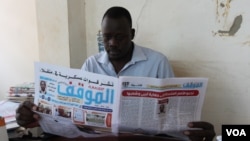Mathiang Cirillo, editor in chief of Almaugif, says South Sudanese need the Arabic language for several reasons and the underfunding of Arabic newspapers has affected the media outlet.
Almaugif and Al Watan are the two Arabic newspapers in circulation in Juba.
"We should not forget that there are lots of generations who grew up in Khartoum in Egypt and some who studied in Arabic in Juba before the country gained independence in 2011. Most of them could read Arabic, are writing in Arabic. So, Arabic as a language is still alive in South Sudan," Cirillo said.
When South Sudan separated from Sudan on July 9, 2011, the world’s newest nation adopted English as its official language of communication, though the majority of South Sudanese communicated in colloquial Arabic.
Cirillo said institutions such as the courts and police across the country still use Arabic as the medium of communication.
"If you go to any police station and open a case, they will investigate you in Arabic. Even in the courts, they use Arabic. When you go to the markets, Arabic is the main language of communication," he said.
Cirillo said international organizations supporting media development in South Sudan have done very little to support Arabic newspapers in Juba.
Almaugif prints 1,000 copies daily which are distributed by vendors across the city. Cirillo says proceeds from the sales are not enough to keep him in business. The newspaper survives largely on advertisements.
The president of the Union of Journalists of South Sudan (UJOSS), Patrick Oyet, says Arabic newspapers are not getting donors' attention for several reasons.
"I think largely because the official language in South Sudan is now English, most of the donors are not really into funding papers that print in Arabic, which I think is wrong. The [Arabic] newspapers are not strategic in the way of generating money," Oyet said.
Oyet said he predicts a gloom future for Arabic newspapers in South Sudan, and with more media houses closing, "you see Arabic newspapers closing and they never come back."
He said his organization has been advocating for support to print and broadcast journalists across the country, regardless of their language of operation.
Cirillo says Arabic remains strategic for security reasons, adding that South Sudanese who live in the northern part of the country have been displaced by conflict and are now studying Arabic in Sudan.
"There are lots of issues left unresolved with Sudan. How can we ignore Arabic language?" Cirillo said.




